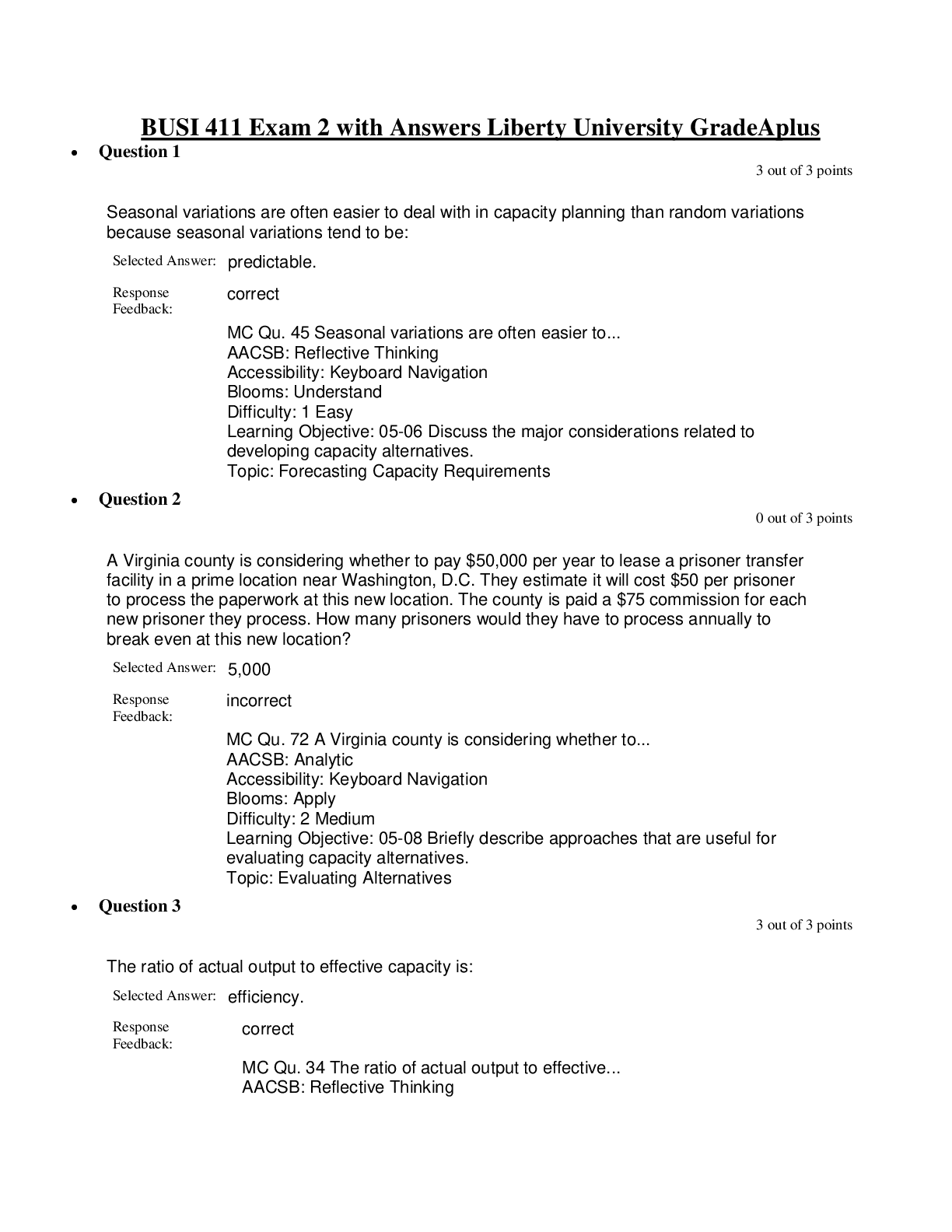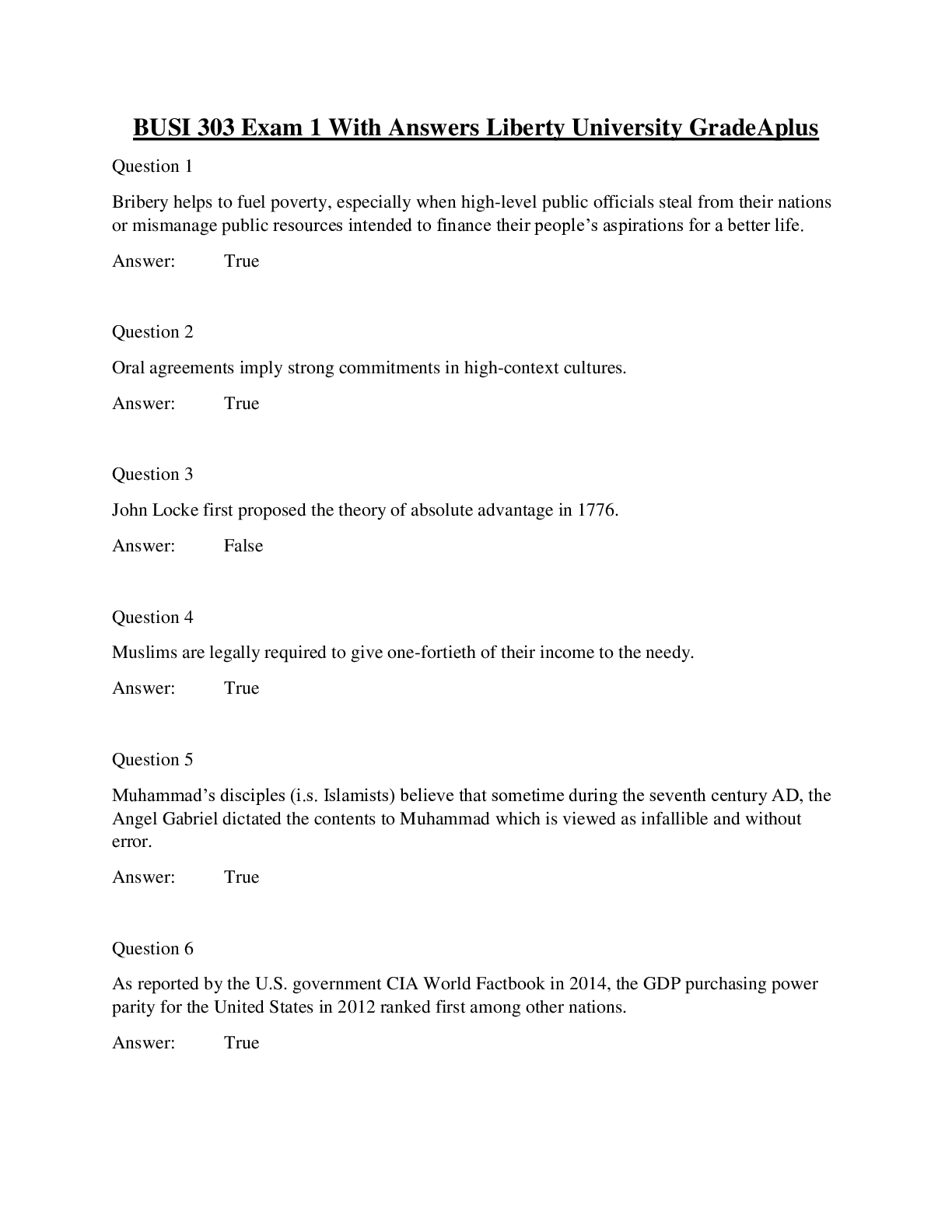BUSI 303 Exam 2 With Answers Liberty University GradeAplus
Document Content and Description Below
Question 1 Companies often find motivational reasons to expand globally. These motivations can be categorized into 4 groups: primary, alternate, proactive and reactive. Question 2 The progressive... stages of economic integration, in order of intensity are: Preferential Trade Area, Custom Union, Free Trade Area, Common Market, and EU. Question 3 A large portion of all FX market transactions are spot transactions. Question 4 The Euro is the world’s leading currency. Question 5 Every country may not necessarily have its own security exchange. Question 6 The intended outcome of regional economic integration is to promote economic prosperity and stability among signatory nations. Question 7 The initial goal of NAFTA was to increase investment and decrease tariffs between Mexico and the U.S. Question 8 Decisions to move domestic operations and products into the global marketplace include the desire to increase sales and profitability and to realize cost savings and profitability as a result of a partial or whole relocation in a foreign nation. Question 9 Two types of entry modes are available into a market: low intensity and high intensity. The main difference between the two depends on how much risk and/or control an entering business is willing to take. Question 10 Capacity planning is suggested, but not necessary, within operations management to allow companies to succeed. Question 11 In the U.S., the Federal Reserve Bank is responsible to regulate the growth of the economy. Question 12 The intent of forming a trading bloc may range from the potential of trade creation to the desire for economic protectionism. Question 13 Firms with reactive motivation will most likely enter the international market because they want to take the initiative to be aggressive while proactive firms go international because they must in order to compete. Question 14 One of the benefits of trading blocs is greater division of labor. Question 15 Two major contributing circumstances of the demise of the gold standard were the Great Depression and the Vietnam War. Question 16 European Community established its Exchange Rate Mechanism (ERM) in 1979 and formed the initial steps for the creation of a single European currency. Question 17 Operational bottleneck refers to the fact that capacity of a multistep production process is limited to the total output of the slowest process. Question 18 Production related reasons seem to be a small motivation why some domestic firms expand globally. Question 19 Export intermediaries are utilized to provide expertise to inexperienced exporters as they enter overseas markets. Question 20 Total quality management stresses the importance of teamwork. Question 21 Make or buy decisions can be taken lightly. Question 22 The reasoning behind layout of a facility is to maximize the work environment for customers, employee and the building itself. Question 23 Mercosur was initiated to expand the markets of Argentina, Brazil, Iran, and India. Question 24 A license is an agreement that allows one party to use an industrial property right in exchange for payment to the other party. The party giving the license is the licensee, while the party that gets to use the right is the licensor. Question 25 Total quality management must be based on ethics, integrity and trust in order to have a solid foundation. Question 26 Tax on imports is one example of a tariff barrier. Question 27 A facilitator is an individual whose job is to help to manage a process of information exchange. Question 28 The following factors are reactive motivations for firms to expand into the global economy: Competitive pressure, Excess capacity, Underproduction, Saturated or declining home market. Question 29 The futures market allows smaller traders to participate in a trade. Question 30 In a Free Trade area, member nations are allowed to determine their own trade policies with non-members. Question 31 Subsidies are special privileges that governments provide to the businesses in order to attract them to a region or simply to have funds required to operate successfully. Question 32 Some firms would rather remain domestic, but the market forces them global in order to remain profitable. Question 33 The adoption of the floating exchange rate resulted from the conclusion of the Bretton Woods Agreement. Question 34 Centralization allows decisions making authority to occur where the decisions are to be made. Question 35 The necessary conditions for expansion into global market, which drive global expansion, include expanding markets, gaining access to resources, increasing costs, and capitalizing on special feature of location. Question 36 In formulating a strategic global market entry plan, business managers should focus on: identifying the most attractive foreign markets to the firm; determining the best time to enter the global market; and whether to enter a potential market utilizing a large or small scale strategy. Question 37 The core element of regional economic integration is the trading bloc. Question 38 Firms are not at risk if they decide not to carefully examine, assess and evaluate a country’s organizational, social, cultural, political, judicial, market, economic, technological and industry trends prior to determine whether entry into an international market is financially feasible, unfavorable, or risky. Question 39 The major disadvantage to the new form of centralization is that it does not allow for innovative thinking, nor does it engender employee initiative for problem solving. Question 40 The World Bank was established to help finance economic development in poor, under developed countries. [Show More]
Last updated: 2 years ago
Preview 1 out of 7 pages

Buy this document to get the full access instantly
Instant Download Access after purchase
Buy NowInstant download
We Accept:

Reviews( 0 )
$20.00
Can't find what you want? Try our AI powered Search
Document information
Connected school, study & course
About the document
Uploaded On
Feb 24, 2020
Number of pages
7
Written in
Additional information
This document has been written for:
Uploaded
Feb 24, 2020
Downloads
0
Views
124


























